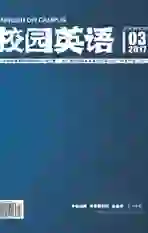Exploration on the Differences between China’s Traditional and Communicative Teaching Method
2017-03-15朱加强
朱加强
【Abstract】As Chinas policy Open and Reform moves further and further, more and more foreign values flow into Chinese brain. When it comes to the field of education, the appearance of Communicative Language Teaching has challenged Chinas traditional teaching methodology. This essay agrees to the new teaching methodology and illustrates briefly differences between the traditional teaching method and the modern one.
【Key words】teaching methodology; Communicative Language Teaching; English class
1. Introduction
In todays China, it is a fact that there are still many cases of adopting the traditional teaching method, the rural places in particular. From the primary school to college or university, Chinese students are always dependent on their teachers. However, with the paces of Chinas opening going further, the writer does believe that Communicative Language Teaching will be adapted in China.
2. Comparison between Traditional and Communicative Teaching Method
2.1 Chinas Traditional Teaching Method
The traditional teaching method owns its dominant position in many colleges as before. Teachers are used to arranging their teaching task according to the teaching curriculum, and they are the center for most of the time in classrooms. It results in the lack of practice of reviewing what students have been taught. To some extent, this method blocks the development of both teachers and students. In traditional teaching method, there is another term called Knowledge Transfer. Knowledge transfer is a process that knowledge is put into students from classrooms to houses. The efficiency of teaching and learning will develop by leaps and bounds.
Two examples are listed in the following.
Example 1: the Imperial Examination
The Imperial Examination which originates from the early 6th century of Sui Dynasty and ends in the early 20th century of Qing Dynasty owns a long history for about two thousand years. This exam is aimed at selecting the officials from the average people, students here are required to memorize a lot of classic works by Confucius and other learned Confucianism masters. It is a strongly purposeful exam, the majority of students attending it desires for obtaining an occupation of officials. Under the circumstances, a common willingness occurs that just following rules and requirements of teachers instead of making breakthrough and innovation: to memorize a lot of classic works by Confucius and other learned Confucianism masters.
Example 2: the College-Entrance Examination
Around in June, the College-Entrance Examination will be held around China. After staying in school for more than ten years, most of high school students are required by their parents or teachers to attend it. The College-Entrance Examination is regarded as the tool to exam the students ability only from how many scores they get. Consequently, students pay much more attention to the final score instead of whether the knowledge can be applied or useful for them.
2.2 Communicative Language Teaching
Communicative Language Teaching is a kind of facilitative communicative continuum that is totally distinctive with the Chinese traditional one, which refers that teacher-spoon feeds students in teaching practice. And it is learner-centered and learner-controlled. It is learner that feeds himself. More likely, this kind of discovery learning helps to rise the interest and attract the attention of students, and it will let them attach the teaching goals by themselves.
3. Conclusion
There is no doubt that English plays an important role in every field, especially in education. English as a foreign language has been deeply rooted in Chinese educational system, and it even accompanies Chinese students throughout their whole study life. The way students learn English is too far away from how English is used in real life.English teachers ought to try to improve their teaching level by adopting Communicative Language Teaching which lays emphasis on promoting students communicative competence.
References:
[1]Cui Y.H.,Wang Y.(2014).Flipped Classroom Model and Its Application in College English Teaching[J].China Audio Visual Education,11:116-121.
[2]Deng J.G.(2007).The Ethic look on the Imperial Examination [D].Hunan Normal University.
[3]Li B.H.,Sun X.l.S.(2013).Autonomous Learning and Improving Communicative Competence[J].海外英語,02:32-35+38.
